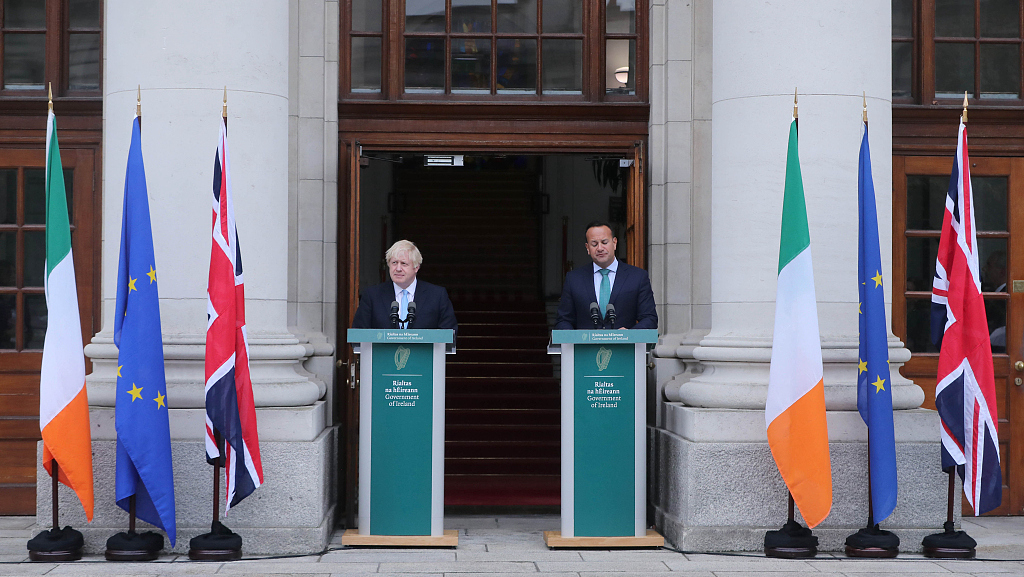

Editor's note: Richard Fairchild is an associate professor at the Finance of School of Management, University of Bath. The article reflects the author's opinions, and not necessarily those of CGTN.
The British Parliament is now closed for five weeks, prorogued until October 14, 2019. Following a crazy, tumultuous and emotional first and only week back after the Summer recess (September 2-9), PM Boris Johnson was continually defeated in Parliament. There were mass defections from his Conservative Party. Johnson lost his slender majority in the House, losing all of his power. Rebel Tories joined with opposition MPs to vote through a bill, now in law, to block Johnson leaving with a no-deal Brexit on October 31, 2019. Johnson reacted angrily by sacking those rebels who had acted against him. The prime minister then tried, and failed twice, to secure support for a general election on October 14.
Johnson's desperate position then emerged in his meeting this week with the Irish Prime Minister, Leo Varadkar, in Dublin. Johnson stated that he had examined the consequences of a no-deal. He told the Irish leader that, although Brexit with no-deal was possible (he omitted to note that the law will now stop him from doing that!), nobody wants it, and to leave without a deal would be a failure of statecraft. His tone had softened, and he was a shadow of the man who shouted stridently last week that we would leave on October 31, with or without a deal. He appears to have lost his swagger, and his "do or die" spirit!
It seems to me that the scenes in Parliament during the week became more and more shambolic and emotional. All reason seems to have gone out of the window, and, in my opinion, the reputation of the people and processes in the House of Commons have been shattered. It seems that the political landscape has changed forever, and that the British public's trust and faith in our politicians has evaporated!
Indeed, the enduring memory of the week comes from the final hours of the final day (September 9): as Parliament was drawing to a close, the speaker, John Bercow, stood to try to walk out of the House of Commons, into the House of Lords, so that he could go through the process of closing Parliament. At this point, several MPs physically grabbed him, and tried to stop him from leaving: amid angry scenes, scuffles broke out, and one MP fell to the floor.

A video grab from footage broadcast by the UK Parliament's Parliamentary Recording Unit (PRU) shows MPs listening to the Speaker of the House of Commons, John Bercow, reading the address from the Queen, London UK, September 10, 2019. /VCG Photo
However, amidst all of the shambles, the emotions, the anger and despair, there is some hope. The Guardian newspaper (September 10, 2019) reported on a little noticed event which happened in Parliament, under the radar, last week.
They note that a group of cross-party MPs has formally launched a campaign to win cross-party support for a managed Brexit deal that embodies the spirit of compromise. This group proposes using elements of Theresa May's original Brexit proposals as a basis for a deal that could possibly be steered through Parliament. How did this hopeful compromise come about?
When the rebels' bill to stop the no-deal Brexit on October 31 was presented to the House, Labor MP Stephen Kinnock proposed an amendment to the bill, which suggested the compromise, using May's plans as a basis and focus for any extension. This was unexpectedly passed last week.
According to the organizers, up to 50 cross-party MPs so far have backed the plan. Stephen Kinnock notes that the idea is not to reproduce a carbon-copy of Theresa May's three-times rejected plan.
Instead, it is modeled upon, and brings the best elements of, the failed negotiations that took place between May and Labor: A true compromise! The view of the group is that this would have a consensual and pragmatic focus, based on the voice of reason, "rooted in reality." Kinnock said, "We have the basic foundations of a perfectly pragmatic deal that can command a majority in Parliament and begin to re-unite our deeply divided country."
As Norman Lamb, the sole Liberal Democrat in the group noted, Boris Johnson has boxed himself into a corner, and this compromise deal could be a way for him to steer a deal through Parliament, and get a deal with the EU.
In my opinion, this compromise plan offers an excellent possibility of reuniting the country and gaining EU agreement for an extension. As noted by the proposers, crashing out with a no-deal Brexit would alienate and anger half of the British population.
However, a second referendum could also be deeply divisive, angering the half of the population who voted for Brexit, who would feel tricked. This compromise could be the perfect solution. Furthermore, any extension to the Brexit deadline has to be agreed by the EU. The EU have already stated that they will only keep granting extensions if they feel that Britain is making progress toward a deal in a united way. This compromise may be the sensible way forward.
(If you want to contribute and have specific expertise, please contact us at opinions@cgtn.com)

Copyright © 2018 CGTN. Beijing ICP prepared NO.16065310-3
Copyright © 2018 CGTN. Beijing ICP prepared NO.16065310-3